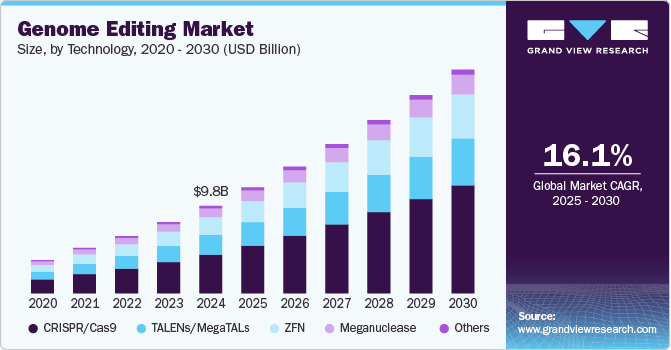-
Feed de notícias
- EXPLORAR
-
Páginas
-
Grupos
-
Eventos
-
Blogs
Genome Editing Market Fueled by Increasing Biotech Collaborations

The global genome editing market size was estimated at USD 9.78 billion in 2024 and is projected to reach USD 25.00 billion by 2030, growing at a CAGR of 16.1% from 2025 to 2030. This growth is driven by successful preclinical models boosting the demand for genome editing therapeutics, intensifying competition among market players, rapid advancements in gene editing technologies, and increased adoption within agricultural biotechnology.
The swift advancement of CRISPR-based tools has notably fueled the expansion of the genome editing industry. Innovative genome editing technologies that allow for precise manipulation of genomic DNA have ushered in a transformative phase in therapeutic development and disease detection. As a result, service providers are now able to explore new and previously untapped opportunities in this sector. Additionally, growing government funding, increased production of genetically modified crops, and a rise in genomics projects are expected to sustain market growth.
To enhance their competitive edge, many companies are forming licensing agreements with technology developers, while major players are focusing on strategic partnerships and acquisitions to broaden their global footprint. For example, in February 2024, Precision BioSciences licensed its patented technology to Caribou Biosciences, enabling targeted insertion of exogenous antigen binding receptors into the TRAC gene locus of human T cells. This agreement involved upfront payments, royalties, and potential milestone payments.
CRISPR technology is anticipated to be the leading innovation within the biotechnology space. By leveraging bacterial immune mechanisms, CRISPR allows for efficient gene knockouts and insertions, outperforming traditional genome editing techniques, which are often time-consuming and inefficient. This transformative technology is making significant contributions in various domains such as plant, animal, and cell line engineering, as well as drug development and monitoring. It enables precise gene combination experiments, gene expression control, and DNA base function identification.
In agriculture, advances in genomics are improving crop genetics, with widespread sequencing of genomes and transcriptomes becoming more accessible. Genome editing tools are aiding in the creation of genetically modified crops with enhanced features, improved productivity, and environmental resilience. These advancements support biodiversity conservation, lower agricultural ecological impact, and contribute to addressing food security and poverty reduction.
Order a free sample PDF of the Genome Editing Market Intelligence Study, published by Grand View Research.
Key Market Trends & Insights
- North America dominated the genome editing market, accounting for 44.59% share in 2024, driven by increasing R&D investment.
- The U.S. was the largest contributor to genome editing technology within North America.
- CRISPR/Cas9 led among technologies, holding a 44.36% global revenue share in 2024.
- Genetic engineering was the top application segment in 2024.
- Biotechnology and pharmaceutical companies accounted for the largest end-use share at 50.71% in 2024.
Market Size & Forecast
- 2024 Market Size: USD 9.78 Billion
- 2030 Projected Market Size: USD 25.00 Billion
- CAGR (2025–2030): 16.1%
- North America: Largest market in 2024
- Asia Pacific: Fastest growing market
Key Genome Editing Company Insights
Leading players are focused on expanding their reach and product offerings through partnerships, collaborations, and strategic initiatives that support continued growth and innovation in the genome editing field.
Key Companies:
- Merck KGaA
- Takara Bio Inc.
- Revvity, Inc.
- Danaher Corporation
- GenScript
- New England Biolabs
- Lonza
- Thermo Fisher Scientific, Inc.
- Charles River Laboratories
- Eurofins Scientific
Explore Horizon Databook – The world's most expansive market intelligence platform developed by Grand View Research.
Conclusion:
The genome editing market is poised for robust growth, supported by technological breakthroughs, strategic industry collaborations, and expanding applications in both healthcare and agriculture. As CRISPR and related technologies evolve, the market will witness transformative impacts on gene therapy, crop enhancement, and disease treatment, ultimately reshaping modern science and global health outcomes.
- Art
- Causes
- Crafts
- Dance
- Drinks
- Film
- Fitness
- Food
- Jogos
- Gardening
- Health
- Início
- Literature
- Music
- Networking
- Outro
- Party
- Religion
- Shopping
- Sports
- Theater
- Wellness


